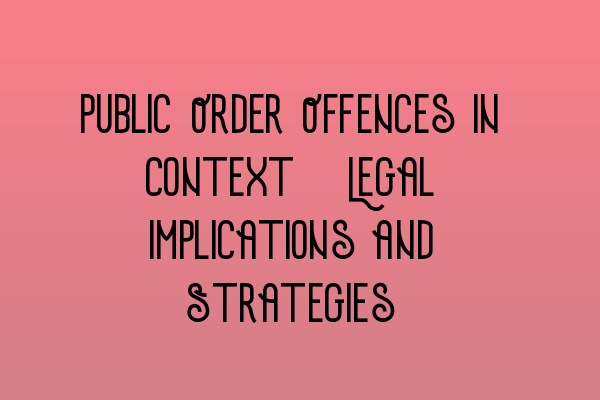Public Order Offences in Context: Legal Implications and Strategies
Public order offences encompass a wide range of criminal activities that disrupt the peace and harmony of society. Understanding the legal implications and strategies associated with public order offences is crucial for both legal professionals and those who may find themselves facing such charges.
What Are Public Order Offences?
Public order offences are criminal acts committed in public places that disturb the tranquility or cause harm to the general public. These offences can include but are not limited to:
- Public disturbances
- Rioting
- Violent disorder
- Threatening behavior
- Harassment
- Incitement to violence
Such offences can have serious legal consequences, leading to fines, imprisonment, or both. It is important to have a solid understanding of the legal aspects surrounding public order offences to effectively navigate through the judicial system.
The Legal Implications
Public order offences fall within the jurisdiction of criminal law, and prosecutions for these offences are taken seriously by the courts. The legal implications of being charged with a public order offence can vary depending on the circumstances and severity of the offence.
In order to mount a successful defense, it is crucial to consult with an experienced criminal solicitor who specializes in public order offences. They can guide you through the complex legal process, assess the strength of the evidence against you, and provide you with the best possible defense strategy.
Effective Strategies for Public Order Offences
Having a strong defense strategy is vital when facing public order charges. Your solicitor will evaluate the specific circumstances surrounding your case and tailor the defense strategy accordingly. Here are some common strategies that can be employed:
- Challenging the evidence: Your solicitor will scrutinize the evidence presented by the prosecution to identify any weaknesses or inconsistencies that can be challenged in court.
- Questioning witness credibility: If there are witnesses to the alleged offence, your solicitor will assess their credibility and cross-examine them to cast doubt on their testimonies.
- Proving lack of intent: In certain cases, it may be possible to argue that the alleged offence was unintentional or lacked the required intent to constitute a public order offence.
- Alternative explanations: Your solicitor may explore alternative explanations for your behavior, such as self-defense or mistaken identity, to create doubt in the prosecution’s case.
It is important to remember that each case is unique, and the defense strategy should be tailored to the specific circumstances and evidence involved. Consulting with an experienced solicitor who understands public order offences is essential for obtaining the best possible outcome.
Conclusion
Public order offences carry serious legal implications, and it is crucial to have a solid understanding of the legal aspects and effective defense strategies. By seeking legal advice from a knowledgeable criminal solicitor, you can ensure your rights are protected and work towards the best possible outcome in your case.
If you are interested in further exploring the SQE Criminal Law & Practice in the UK, we recommend checking out our related articles:
- SQE 1 Practice Exam Questions
- SQE 1 Practice Mocks FLK1 FLK2
- SQE 2 Preparation Courses
- SQE 1 Preparation Courses
- SRA SQE Exam Dates
Feel free to explore these resources to enhance your understanding in criminal law and practice.
